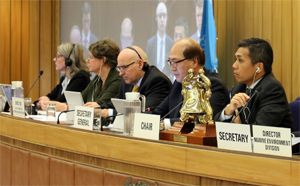The 0.5 percent sulfur limit for marine fuel is on a clear course for implementation in 2020 after the International Maritime Organization (IMO) blocked a recent attempt to delay the measure.
“I can categorically say there will not be a delay,” Edmund Hughes, the head of air pollution and energy efficiency at the IMO, told Reuters during the Asia Pacific Petroleum Conference in Singapore in late September.
Beginning on Jan. 1, 2020, the IMO will require ships to use fuels with a sulfur content of 0.5 percent, compared to the current standard of 3.5 percent. The only exception will be for vessels equipped with scrubbers to remove the sulfur from heavy fuel oil.
IMO flag states will be responsible for monitoring and enforcement and will be empowered to levy fines on vessels that are not in compliance. As an agency of the United Nations, the IMO has no enforcement powers for its regulations, instead relying on flag states for oversight.
The IMO plans to create a level playing field for vessels around the world rather than allowing different regulations for different regions, Hughes told Reuters.
At an October meeting of the IMO’s Marine Environment Protection Committee (MEPC), the panel rejected a proposal for an “experience-building” phase to allow ship operators, engine manufacturers, bunker suppliers, member states and other groups to evaluate and comment on the 0.5 percent sulfur requirement. The proposal was first floated by the Marshall Islands, Liberia and Panama, flag states that represent about 60 percent of the global oceangoing fleet, and by several shipping associations. It was supported by the United States delegation.
While proponents of the measure said it would allow time for data gathering, the IMO saw it as an attempt to delay implementation of the new fuel standard. In Washington, the Trump administration expressed concern about the potential for a bump in fuel costs during an election year. Any formal action to review the regulation would occur after the implementation deadline due to the length of the IMO review process.
To help ensure compliance with the new cap, the MEPC adopted a carriage ban on high-sulfur fuel beginning in March 2020. Port states will be empowered to check the fuel on vessels in their waters to ensure sufficient 0.5 percent fuel is on board for the voyage, unless the vessel is equipped with a scrubber. That means a ship won’t be allowed to carry non-compliant fuel unless it has the means to consume it in accordance with the regulations.
However, Regulation 18 of MARPOL Annex VI will allow ships to use non-compliant fuel beyond the implementation date of the new cap if compliant fuel is not available. A vessel must document efforts to obtain compliant fuel, but those efforts don’t require the vessel to deviate from its voyage to procure it.
California regulations do not allow scrubbers to be used to meet the state’s 0.1 percent sulfur cap, which applies within 24 miles of the state’s coast. Vessels with scrubbers will still need to burn 0.1 percent fuel in those waters.
S&P Global Platts has forecast a shift of up to 3 million barrels per day of marine demand from high-sulfur fuel oil to lower sulfur alternatives, as well as a significant jump in crude prices, as refiners increase runs to maximize middle distillate output.

